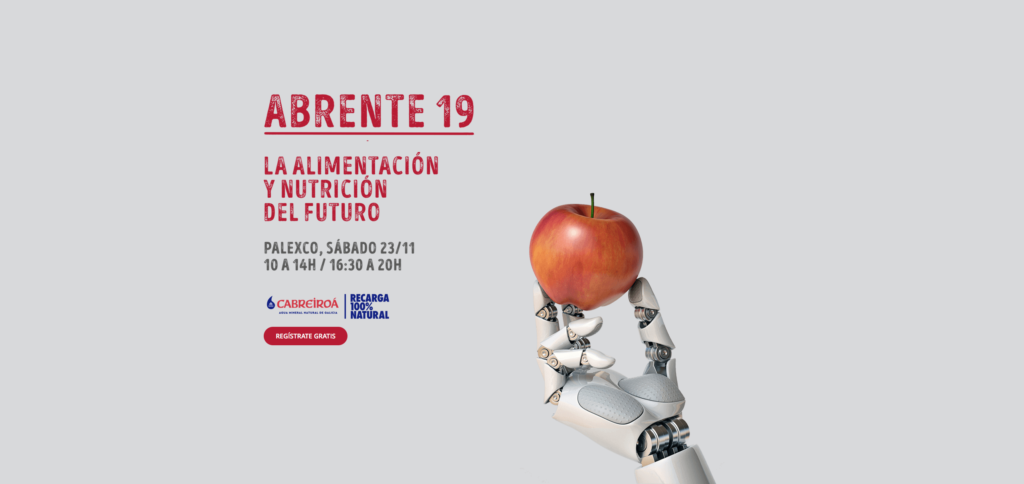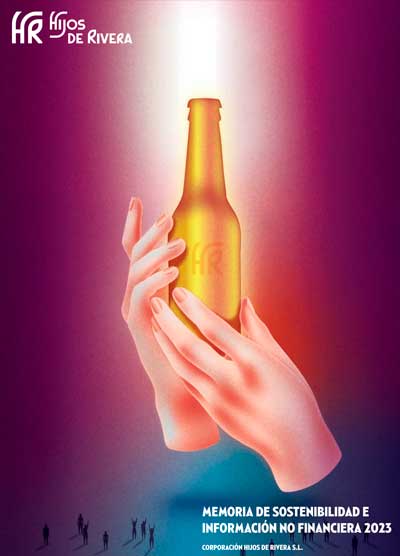On 23 November, some of the best scientists in Spain will gather in A Coruña with Cabreiroá to speak about some of the most common concerns about healthy eating in an entertaining and fun way.

The Palexco auditorium in A Coruña will be the setting for the first edition of “Abrente, Alimentación y Nutrición del futuro” “(Abrente, Food and Nutrition of the future”), a day that will bring together some of the best scientists of our country to address in a fun and entertaining way some of the most important common concerns about healthy eating and the short and mid term challenges.
This event will take place on November 23 with the collaboration of Cabreiroá and will be free to anyone who wishes to attend, prior registration on the web: https://cabreiroa.es/es/abrente/
Abrente aims to answer some of the questions that everyone asks at some point, such as the safety of genetically modified foods, the effectiveness of diets, the consequences of global warming on our eating habits or the large number of stories that are currently doing the rounds about certain foods.
After the presentation by the poetical-musical duo Aldaolado, Abrente 2019 will continue with the participation of such renowned names in the scientific sphere like JM Mulet, Beatriz Robles, Gabriela Uriarte and Juan Ignacio Pérez Iglesias, among others.
PROGRAMME
23 November 2019. Palexco (A Coruña)
Morning Session
9:30am- Doors Open
10:00am- Event Presentation
10:10am- Al principio fue el fuego (“In the beginning there was fire”)
Juan Ignacio Pérez Iglesias, Professor of Physiology, and Chair of Scientific Culture of the University of the Basque Country.
Fire from the point of view of evolutionary biology and physiology. Fire changed the way we eat and, therefore, has influenced our evolution as a species. Other advances followed, such as the fermentation of dairy and alcoholic beverages. Cooking made us human.
10:40am- La desinformación que te tragas (“The disinformation you swallow”)
Beatriz Robles, food technologist and dietician nutritionist.
We are under the impression that we increasingly worry about food, however, we feel so bloated that it is difficult to make the right decisions. Not everything we think is healthy for us really is. What should we know about lactose, gluten, food additives, sugars … What are the most widespread food myths, how and why they spread, and how we can deal with them.
11:10am- Esto no va de osos polares (“This is not about polar bears”)
Antonio Martínez Ron, scientific journalist
Global warming is affecting the quality and availability of certain foods. This is a subject that is close to home. In Spain, clementines, grapes, cork trees, mussels, sardines… are all being affected. Climate change is not just about polar bears.
12:10pm-Sin dieta para siempre (“Diet-less for ever”)
Gabriela Uriarte, dietician nutritionist
The number of diets we’ve followed in our lives and how many times we have failed. Miracle diets we’ve read in cheap magazines or that have been recommended by a friend. Diets never work if they have an expiry date. They are not healthy for our body, or our mind, or our pocket.
12:40pm- La ciencia del mejor cocido galego (“The science behind a good Galician ´cocido´”)
Deborah García Bello, chemist and scientific commentator.
The kitchen is the lab we all have at home. Deborah learnt to cook typical Galician dishes with her grandmother, and thanks to her scientific knowledge she now claims to make the best Galician stew in the world. Chemistry is behind the octopus á feira, the lacon con grelosand the Padrón peppers, some of which are spicy while others aren’t. Galician gastronomy with frying pans as flasks.
1:10-2:00pm- Round Table
Afternoon Session
4:30pm- Presentation
4:35pm- Transgénicos sin miedo (“Genetically modified food without fear”)
JM Mulet, Biotechnology lecturer at UPV, researcher at IBMCP
Nutrition and genetically modified food have become one of the scientific debates par excellence in Spain, and the whole world, in recent years. The genetic manipulation of food is today one of the greatest taboos in society. Ecological groups have organized campaigns against them and against their supposed negative consequences for the health. But has anyone wondered what the benefits of GMOs and scientific advances are when applied to food? What do scientists think about this subject? Do we have all the information we need to be able to judge for ourselves? Or are we subject to the influence of opposing interests that have nothing to do with what suits us or not?
5:05pm- Presente y futuro de la alimentación deportiva (“Present and Future of sports nutrition”)
Amaia Martioda, Cyclist and Dietary nutritionist.
How sports nutrition has evolved in recent years. What are the most frequent doubts, from those who refuse to keep to a specific diet while being a sports professional, to those who are fond of sports and who supplement and follow diets that are more typical of professional athletes. What we should know about sports nutrition and what is to come.
5:35pm- Dime que sientes y te diré como comes (“ Tell me how you feel and I’ll tell you how you eat”)
Griselda Herrero, CEO of Norte Salud Nutrición. Psycho-nutrition expert, Eating disorders and obesity. Associate professor at the Pablo de Olavide University
The act of eating is not always voluntary and physiological. There are numerous factors that influence our decision to eat, or to choose certain foods. One of those factors is our emotions. We feel, think and act accordingly. Emotions and our food choices are linked in a two-way relation and, therefore, it is essential to know how this link is generated, since when and how emotions play tricks on us when deciding what to eat.
6:25pm- Qué llevar de merienda a Marte (“What to take to Mars for tea”)
Borja Tosar, Astrophysicist and scientific commentator, and José Vilariño, Doctor in chemistry and head of R+D at Hijos de Rivera
In the history of humanity, curiosity has always led us to explore the unknown, from the first hominids who left Africa about 70,000 years ago to the time of the great navigators, exploring unchartered oceans. Nowadays, we are beginning to face the new frontier, space flights, with the red planet on the horizon. Now we know much more than our ancestors, but the main problem remains the same, because deep down, although we are more knowledgeable, our basic needs stay the same: what can I take to snack on?
6:55pm- Amoure por la grasa (“Love of fat”)
Ricardo Moure, Biologist, Doctor in Biomedical Biotechnology and member of Big Van Ciencia.
Ricardo Moure, biologist, doctor in biotechnology, stand-up comedian and, in general, dad-bod, will speak to us about the subject that his life has revolved around: fat. Stand up humour and science with autobiographical notes about how obesity affects the brain.
7:25-8:00pm- Round Table



